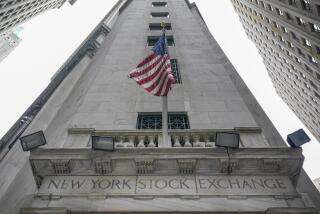Senate OKs release of remaining $350 billion in financial bailout fund
- Share via
NEW YORK AND WASHINGTON — Months after the worst of the financial crisis seemed to have passed, fears of debilitating losses for the nation’s banks returned to the forefront Thursday on Wall Street and in Washington.
The federal government said late Thursday night that it had agreed to invest an additional $20 billion in Bank of America Corp. and to share losses on $118 billion of the company’s assets.
The announcement came after a Senate vote gave President-elect Barack Obama access to the second half of the government’s $700-billion financial rescue fund.
Earlier in the day, traders pounded financial stocks on growing worries about the sector and on market rumors that Citigroup Inc. or Bank of America -- or both -- could even be nationalized.
When the financial crisis reached its peak last fall, the fear was that it would damage the overall economy. But after a surge in unemployment, a plunge in retail sales and a consensus that a deep recession is underway, the worry on Wall Street now is that the worsening economy will cause spiraling losses for banks, which have already reported hundreds of billions of dollars of mostly mortgage-related write-downs since the home-loan meltdown began about two years ago.
An index of bank stocks plunged 11% on Thursday, before rebounding to close with a 5.1% loss. The Dow industrials sank more than 200 points but ended with a 12-point gain.
Shares of Citigroup and Bank of America lost more than one-quarter of their value before finishing the day down 15% and 18%, respectively.
“The market is saying, ‘Oh my, these guys have a continuing stream of losses that is likely to get worse with a deepening recession,’ ” said Dan Alpert, managing director at Westwood Capital, a New York-based investment bank.
In Washington, despite widespread bipartisan dissatisfaction with how the Bush administration spent the first $350 billion of the financial rescue fund, the Senate voted 52 to 42 against a Republican-sponsored bill to block release of the remaining $350 billion.
Many lawmakers have criticized Treasury Secretary Henry M. Paulson’s surprise decision last fall to drop plans to use the money to buy toxic mortgage-backed securities and to instead make direct injections of cash into banks to stabilize the financial system.
Democrats also were upset that Paulson didn’t use any of the money to modify mortgages to reduce the number of foreclosures.
“I know this wasn’t an easy vote because of the frustration so many of us share about how the first half of this plan was implemented,” Obama said after the vote. He had lobbied strongly for the money.
In a letter Thursday to Senate Majority Leader Harry Reid (D-Nev.), Obama’s top economic advisor, Lawrence Summers, committed to spending $50 billion to $100 billion in a “sweeping effort” to address the foreclosure crisis.
He said Obama would personally approve any “substantial new investments” made with the money and would notify Congress before making those expenditures. Summers also said the incoming administration had no intention of using the money to “implement an industrial policy.”
That statement was an attempt to address Republican anger that the Bush administration committed about $19.4 billion from the fund to automakers General Motors Corp. and Chrysler. Republicans called that an improper use of money intended for financial institutions and an unacceptable intervention in the broader economy.
Most Senate Democrats argued that Obama should not be denied access to the money because of how the Bush administration handled the first half.
“We must give our new president every tool to try to fix this economy,” Reid said.
Still, eight Senate Democrats, along with independent Bernie Sanders of Vermont, who usually backs the party, voted to deny Obama access to the money. Six Republicans voted to defeat the resolution.
BofA reportedly began in December to seek further government assistance to absorb growing credit losses at New York brokerage giant Merrill Lynch & Co., which the Charlotte, N.C., bank agreed to buy in September as Lehman Bros. Holdings Inc. entered bankruptcy proceedings. The Merrill acquisition closed Jan. 1.
The Treasury Department already holds $25 billion in Bank of America preferred stock as a result of capital infusions of $15 billion for the bank and $10 billion for Merrill when the bailout fund first got up and running in the fall.
The new assistance for Bank of America resembles follow-up aid given in November to Citigroup, which also received $25 billion in the first round of infusions.
Under the agreement with the government announced Thursday night, Bank of America must slash its quarterly dividend to holders of its common stock to a penny a share from the current 32 cents a share -- and can’t raise it for three years without government permission.
Bank of America and Citigroup are scheduled to report their first-quarter results today after moving up the release of the reports from next week.
Citigroup is expected to announce a $10-billion fourth-quarter operating loss and to give details of a major restructuring in which it would sell a variety of businesses.
--
jim.puzzanghera@latimes.com
More to Read
Inside the business of entertainment
The Wide Shot brings you news, analysis and insights on everything from streaming wars to production — and what it all means for the future.
You may occasionally receive promotional content from the Los Angeles Times.











